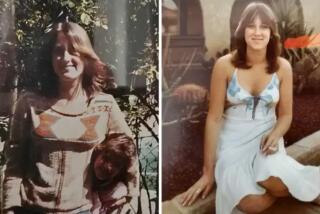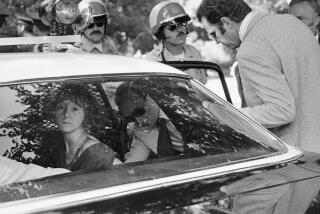Maxwell Keith dies at 87; defense attorney for 2 Manson family members
Maxwell S. Keith, the defense attorney for two members of the Manson family who went to prison for their roles in the grisly 1969 Tate-LaBianca murders, died Tuesday of natural causes in the San Luis Obispo County town of Templeton, his family said. He was 87.
Keith entered the sensational case in December 1970 when he was appointed by the court to replace the attorney for Leslie Van Houten, the former prom queen charged with murdering Leno and Rosemary LaBianca and conspiring to kill Sharon Tate and four others.
He took over her defense just before closing arguments and had only a few weeks to review more than 18,000 pages of court documents. The trial ended in a hung jury. He remained Van Houten’s attorney during the retrial, which ended in 1978 with her conviction for first-degree murder.
Keith also represented Charles “Tex” Watson, who in 1971 was convicted of first-degree murder for his involvement in the murders.
In both cases, Keith argued that his clients had been brainwashed by Manson into committing the heinous crimes.
“Max was a part of Manson trial history and was a very eloquent attorney,” said former Manson prosecutor Stephen R. Kay. “I actually thought he gave the best argument of all the defense attorneys.”
Keith was born in Pasadena on July 16, 1924. After serving in the Army Air Forces during World War II he graduated from Princeton University in 1946 with a degree in economics. He went on to Loyola Law School and passed the bar in 1953.
He worked as a deputy district attorney for several years before entering private practice with attorney Grant B. Cooper. In 1960 he took over for Cooper as chief counsel for Dr. R. Bernard Finch, a West Covina physician accused of killing his wife. “That was the trial of the century of its day,” Kay said.
Finch was convicted, but Keith made a name for himself in the legal community, which led to his appointment to the Manson family cases.
He replaced attorney Ronald Hughes, who had disappeared during a rainstorm in Ventura County when the trial was nearing its end. Hughes’ body was found in a creek near his campsite several months later. No signs of foul play were found, but speculation abounded that he was killed after angering the cult leader with his vigorous defense of Van Houten.
Keith targeted Manson as the mastermind of the crime rampage that resulted in the deaths of seven people, including Tate, the pregnant wife of director Roman Polanski.
Keith “became the first, and only, defense attorney to accuse Manson of these murders,” lead Manson prosecutor Vincent Bugliosi wrote in “Helter Skelter,” his 1974 account of the crimes that shook Los Angeles at the end of the ‘60s.
“Those who knew him well described him as conscientious, totally ethical, and completely professional, and it was clear from the start that he would be representing his client and not Manson,” Bugliosi wrote.
In 1994 Keith was honored with the Joseph Rosen Justice Award of the Los Angeles Criminal Courts Bar Assn. He retired in 1995.
He is survived by his wife, Alison; children Elizabeth Keith, Alison Stirling, Hilary Keith and Adelaide Murosons Gordon and Alexander; eight grandchildren and a great-grandchild.
More to Read
Start your day right
Sign up for Essential California for the L.A. Times biggest news, features and recommendations in your inbox six days a week.
You may occasionally receive promotional content from the Los Angeles Times.




















































